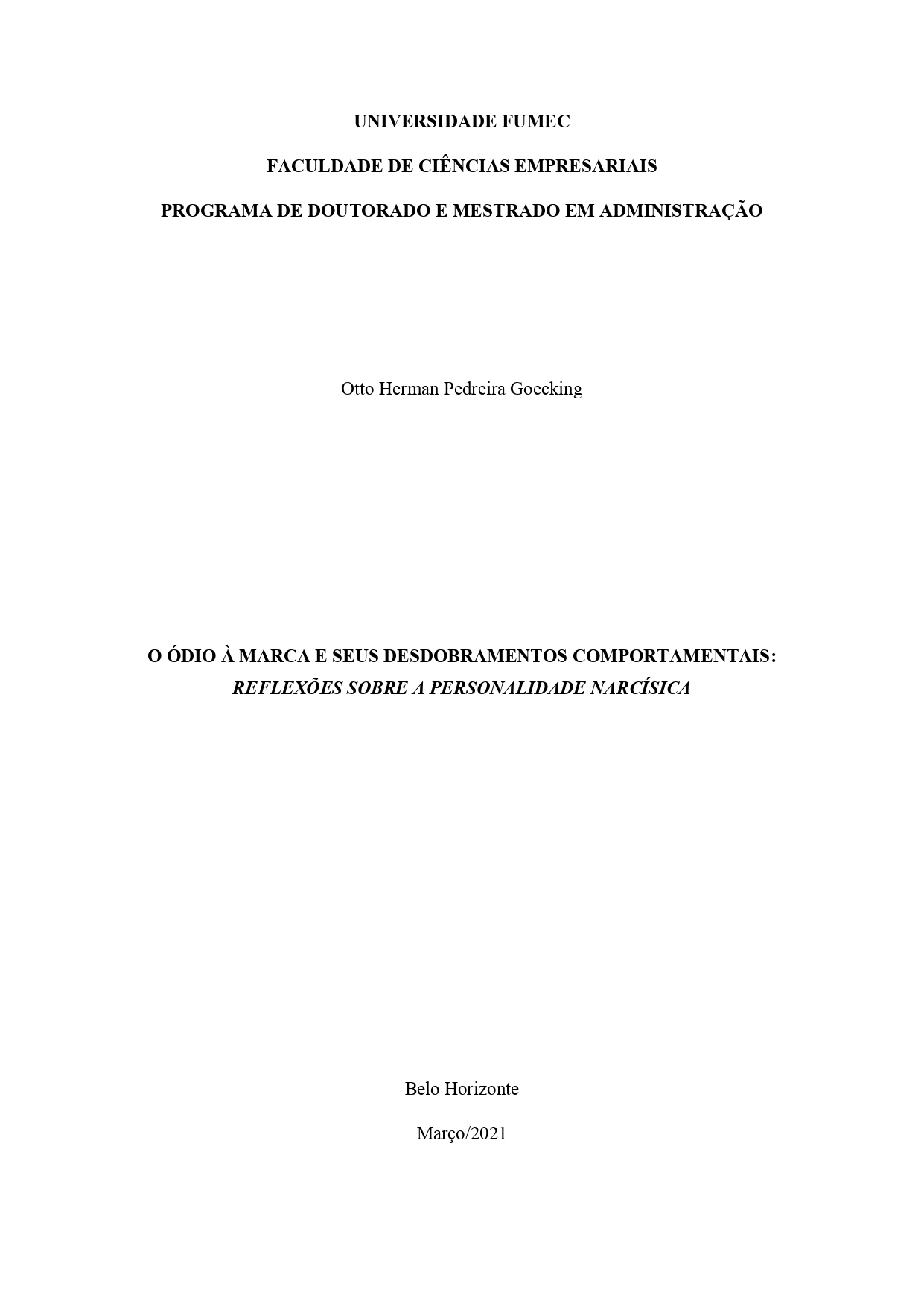O ódio à marca e seus desdobramentos comportamentais: reflexões sobre a personalidade narcísica

Visualizar/
Data
2021Autor
Goecking, Otto Herman Pedreira
xmlui.mirage2.itemSummaryView.MetaData
Mostrar registro completoResumo
Objetivo: Esta tese traz como proposta estudar o ódio à marca e seus desdobramentos
comportamentais a partir das relações entre experiências negativas com uma marca e o
burning brand hate (construto multidimensional secundário, distinto e único,
constituído por três emoções-chave formativas de primeira ordem: nojo, desprezo e
raiva). Essas relações, quando moderadas pela personalidade narcísica, considerando a
Teoria Triangular de Sternberg (2003) e a evolução teórica e empírica do ódio à marca,
constituíram objetos de reflexão para este estudo. Não foi discutido o papel da
personalidade narcísica na geração de sentimentos de ódio em relação a uma marca,
aqui proposto como fator moderador. O efeito moderador, teoricamente, afeta a
intensidade da relação entre duas variáveis.
Método: Foi aplicada uma pesquisa conclusiva, descritiva e causal, usando um modelo
de equações estruturais via CB-SEM. Um total de 1217 respondentes, sendo 371 do
Brasil e 846 da Irlanda, foi exposto a uma situação de transgressão de marca, com as
devidas adequações de situação e idioma, para a avaliação das relações entre os
construtos. Os modelos foram comparados a partir da análise de equivalência métrica e
escalar.
Originalidade/Relevância: O estudo do burning brand hate no contexto do
Comportamento do Consumidor pode ser considerado novo e este artigo mostrou que há
necessidade de investigar novos fatores que podem desempenhar papéis moderadores na
relação entre cliente e marca.
Resultados: O modelo geral sugere que há influência significativa da experiência
negativa com a marca sobre o burning brand hate e que há efeito moderador da
personalidade narcísica sobre essa relação. Também foram confirmados, com algumas
ressalvas, para o modelo geral e para a análise multigrupo, os comportamentos gerados
pelo burning brand hate: troca de marca, reclamação privada, reclamação pública,
retaliação de marca, vingança de marca e esforço financeiro para prejudicar uma marca.
Contribuições Teóricas/Metodológicas: Este estudo traz contribuições significativas
para a literatura que trata da relação entre marca e consumidor. Enquanto (Fetscherin,
2019) mostrou que o burning hate gera apenas a reclamação pública e a vingança de
marca e (Kucuk, 2019) não encontrou um padrão para o burning hate, este estudo
desafiou este fluxo de trabalho sugerindo que as transgressões da marca implicam
burning brand hate e que essa relação é mais forte quando moderada por uma
personalidade narcísica e, que ainda, o ódio extremo gera todos os comportamentos
consequentes já estudados até o momento.
Contribuições Gerenciais: Para propósitos gerenciais, os resultados permitem a
utilização de métricas para que empresas possam estreitar relacionamentos com clientes
e gerar vantagem competitiva. Objective: This thesis proposes to study the hate of the brand and its behavioral
consequences from the relationship between negative experiences with a brand and the
burning brand hate (secondary, distinct and unique multidimensional construct,
constituted by three first-order formative key emotions) : disgust, contempt and anger).
These relations, when moderated by the narcissistic personality, considering Sternberg's
Triangular Theory (2003) and the theoretical and empirical evolution of the hate of the
brand, were objects of reflection for this study. The role of the narcissistic personality in
generating feelings of hate towards a brand, here proposed as a moderating factor, was
not discussed. The moderating effect, theoretically, affects the intensity of the
relationship between two variables.
Method: A conclusive, descriptive and causal research was applied, using a structural
equation model via CB-SEM. A total of 1217 respondents, 371 from Brazil and 846
from Ireland, were exposed to a situation of brand transgression, with the appropriate
adjustments of situation and language, for the evaluation of the relationships between
the constructs. The models were compared using the metric and scalar equivalence
analysis.
Originality/Relevance: The study of burning brand hate in the context of Consumer
Behavior can be considered new and this article showed that there is a need to
investigate new factors that can play a moderating role in the relationship between
customer and brand.
Results: The general model suggests that there is a significant influence of the negative
experience with the brand on burning brand hate and that there is a moderating effect of
the narcissistic personality on this relationship. The behaviors generated by burning
brand hate were also confirmed, with some caveats for the general model and for the
multigroup analysis: brand change, private complaint, public complaint, brand
retaliation, brand revenge and financial effort to harm a brand.
Theoretical/Methodological Contributions: This study brings significant
contributions to the literature that deals with the relationship between brand and
consumer. While (Fetscherin, 2019) showed that burning hate only generates public
complaint and brand revenge and (Kucuk, 2019) did not find a pattern for burning hate,
this study challenged this workflow by suggesting that brand transgressions imply
burning brand hate and that this relationship is stronger when moderated by a
narcissistic personality and even though extreme hate generates all the consequent
behaviors that have been studied so far.
Management Contributions: For management purposes, the results allow the use of
metrics so that companies can strengthen relationships with customers and generate
competitive advantage.
